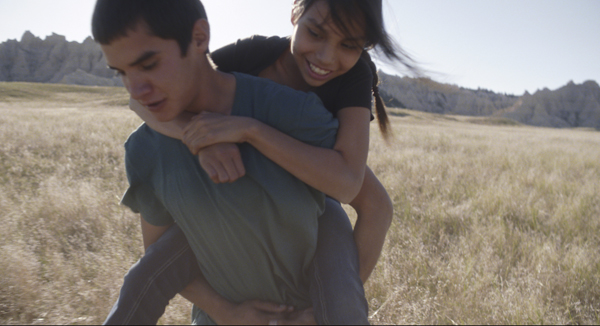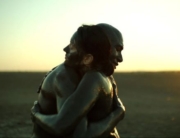Writer/director Chloé Zhao sets her first feature film on the Pine Ridge Indian Reservation in the Badlands of South Dakota. It begins with young Lakota Johnny Winters (John Reddy) patiently breaking in a new horse, describing the process in voice-over: “Anything that runs wild got something bad in ’em. You wanna leave some of that in there, ’cause they need it to survive out here.”
This compelling opening scene sets up expectations that would seem to fall short as the film progresses into a series of disjointed and seemingly random scenes, but for those patient enough to stick with it, Joshua James Richards spiritually inspired cinematography, Zhao’s subtly paced storytelling, and Peter Golub’s doleful music score combine to form an artistic expression akin to free verse poetry.
The story evolves from the perspectives of Johnny and his 11-year-old sister, Jashuan (Jashuan St. John). Early in the film, the man who fathered them (along with 23 other children from nine different women) is killed in a fire. Johnny, like many of his half-brothers, feels he barely knew the man, but Jashuan is deeply affected by the loss. Their mother (Irene Bedard), an alcoholic, provides little in the way of comfort, and Jashuan relies on and looks up to Johnny to provide the time and attention she needs.
Unknown to Jashuan, Johnny is secretly planning to leave the reservation at the end of his senior year of high school to follow his college-bound girlfriend, Aurelia (Taysha Fuller), to Los Angeles. There are few prospects for young people on the reservation besides ranching and bull riding. Alcohol is illegal, and therefore one of the few sources of profit, so to earn money so he can leave, Johnny turns to the dangerous business of booze running. The police is a constant threat, and he also risks being attacked by rival runners. When Jashuan overhears Johnny talking to Aurelia about LA, she feels betrayed and alone, and she turns to the unlikely Travis (Travis Lone Hill) for company, helping the heavily tattooed alcoholic to sell his hand-painted clothing.
The movie has the look and feel of a documentary. The young and inexperienced Lakota actors come across as genuine in the roles they play. The poverty and rampant alcoholism portrayed here is one fact of life on the reservation, but so, too, are the ties to tradition and the close-knit bonds of family and community that the film emphasizes. This yin and yang of reservation life forms the crux of the film. Johnny is torn between the love and sense of responsibility he feels for his sister and extended family and the need to leave the reservation while he has the opportunity.
Richards captures the stark beauty of the Great Plains and the massive storms that roll through, making the isolated reservation appear small and insignificant within the vast landscape. In a closing narration, Johnny explains, “When the wind is too strong, we all know to lean into it so it don’t blow us away.” Zhao has captured this extended community’s sense of place and of who and what they are, as well as the good and the bad that’s needed to survive.
Written and Directed by Chloé Zhao
Produced by Zhao, Angela C. Lee, Mollye Asher, Nina Yang Bongiovi, and Forest Whitaker
Released by Kino Lorber
USA. 94 min. Not rated
With John Reddy, Jashaun St. John, Irene Bedard, and Taysha Fuller







Leave A Comment